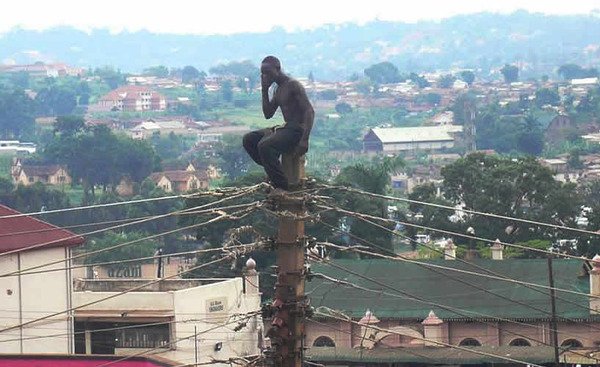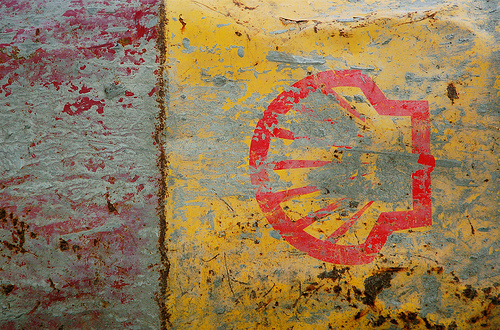by David Steven | Jul 14, 2009 | Africa, Influence and networks

Despite being oil rich, Nigeria is desperately energy poor. Per capita electricity consumption is half that of nearby Ghana and even this limited supply is shockingly unreliable.
When the power shuts down – which it does all the time – people sit in the dark or, if they’re lucky, fire up generators that cost the country $140 billion to fuel (add a chunk more for capital and maintenance costs).
On Twitter, there’s an online demonstration going on at the moment against this crazy situation – with huge numbers of tweets using the #lightupnigeria hashtag. “I know a Doctor that once operated in moonlight because the generator refused to come on!” Olunfunmike writes, “Let’s make a change.”
Please join them – and spread the word. (Cool photo – courtesy plastiqq. Find me on Twitter.)
Update: There’s a newish Facebook group too.
Update II: NEPA – Nigeria’s National Electric Power Authority – needs $3.4bn investment over the next five years. At present, however, it’s operating at a huge loss, in part because it only manages to get customers to pay for 60% of the electricity they use (as one customer puts it, “NEPA doesn’t give me light, but at the end of the month a bill would arrive and they would expect me to pay? I don’t think so.”)
President Obsaanjo has pleaded with the company to at least warn customers of impending power cuts (load shedding) before they happen, but many Nigerians believe that’s all he’s doing – pleading for change.
Last year, a Parliamentary investigative panel claimed that $16bn has been spent on the power system, without delivering much increase in supply.
The House of Representatives investigation alleged that Mr Obasanjo’s government had paid millions of dollars to 34 “non-existent companies”. The committee visited the sites where power stations were meant to be built. It found no work had been done at some sites after several years.
Defending his record, Mr Obasanjo said his government had inherited 18 years of neglect in the power generation industry, and had done well to more than double power supply. Gas pipeline vandalism had hampered power generation. One damaged pipeline took two years to repair, he said. To “the uninitiated” it would seem like no work had been done on the power stations, but the reality was that millions of dollars had been “invested”, he said.
But he said the investigation into the power sector may actually hamper improvement, and jeopardise Nigeria’s development. Private partners were being chased away by the probe because they feared being “criminalised”.
Update III: There’s a logo now.

(more…)
by Alex Evans | Jul 14, 2009 | Africa, Conflict and security

The last two weeks have seen a storm of insurgent activity in Nigeria: Shell’s onshore output has been halved to around 140,000 barrels a day, Chevron has lost about the same again (taking the aggregate output lost to over to a fifth of Nigeria’s total) – and for the first time Lagos has been attacked. According to Africasia.com,
Fighters from the Movement for the Emancipation of the Niger Delta (MEND) attacked the facility, the first strike in Nigeria’s economic nerve centre since the oil insurgency was launched in 2006. Rescuers said five people were burnt beyond recognition in the blast.
“The militants went into open shooting with the naval officers guarding the facility but they were overpowered. They used dynamite to destroy the manifold,” said Geofrey Boukoru, a member of the emergency rescue team.
The militants arrived in four speed boats, exchanging fire sporadically with the navy for about three hours before hurling dynamite into the facility, said a senior official from the Pipelines and Products Marketing Company, an affiliate of the state-run petroleum corporation.
The Lagos attack took place just before the federal government’s planned amnesty release of Henry Okah, the head of MEND – a release that, in the event, still went ahead despite the attack. MEND has since said in a statement that it “considers this release as a step towards genuine peace and prosperity if Nigeria is open to frank talks and deals sincerely with the root issues once and for all” – although as Abubakar Momoh of Lagos State University observes to AlJazeera, “What the government has done in the case of Okah is like treating the symptom and not curing the disease … there are issues that drove the militants to the trenches. Until those issues are resolved in a fair and just manner, there will never be peace in the Niger Delta.”
As David noted back in November last year, counter-insurgency expert John Robb has called Henry Okah “one of the most important people alive today, a brilliant innovator in warfare”. Here’s Robb’s account of how Okah did it. (more…)
by Andrew Pickering | Jun 10, 2009 | Africa, Climate and resource scarcity, Influence and networks

Royal Dutch Shell - Flickr User Lee Otis
After 13 years, Royal Dutch Shell has agreed to pay $15.5 million compensation to settle a court case over its alleged part in the execution of Ken Saro-Wiwa and other Ogoni leaders in the Niger Delta. Much of the backstory can be found here.
Now I’m no judge (not yet, anyway), but $15 million doesn’t seem a lot for a firm with 2008 revenues of $458 billion. Michael Goldhaber, who does know something about law, describes the sum as ‘nuisance value’ from Shell’s point of view.
Yet the fact that Shell settled the day before the trial was due to begin is indicative of the firm’s distaste for either the publicity that court proceedings would create, or the culpability that might be uncovered. (more…)
by Jules Evans | Mar 24, 2009 | Africa, Conflict and security
Check out Stratfor’s funky interactive graphic of power politics in the Niger Delta.
It has a graph showing the relationships between all the big players in the region. They all seem to hate each other. Maybe someone should do something like this for the Brown government…
by Charlie Edwards | Nov 29, 2008 | Africa, Conflict and security
The Nigerian city Jos, the capital of the Plateau State, is the scene of some of the worst sectarian violence in recent years. Up to 300 people were killed after a disputed local election on Friday which has divided the town on social and religious fault lines. Police have imposed a 24-hour curfew and the army is patrolling the streets.

Update, 30/11, 12.40 pm (David): The death toll appears to have risen further:
Residents delivered more bodies to the main mosque in the central Nigerian city of Jos on Sunday, bringing the death toll from two days of clashes between Muslim and Christian gangs to around 400 people.
Rival ethnic and religious mobs have burned homes, shops, mosques and churches in fighting triggered by a disputed local election in a city at the crossroads of Nigeria’s Muslim north and Christian south. It is the country’s worst unrest for years.
Murtala Sani Hashim, who has been registering the dead as they are brought to the city’s main mosque, told Reuters he had listed 367 bodies and more were arriving. Ten corpses wrapped in blankets, two of them infants, lay behind him. A doctor at one of the city’s main hospitals said he had received 25 corpses and 154 injured since the unrest began. “Gunshot wounds, machete injuries, those are the two main types,” Dr Aboi Madaki, director of clinical services at Jos University Teaching Hospital, told Reuters.
The overall toll was expected to be higher, with some victims already buried and others taken to other clinics. The violence appeared to die down on Sunday. Soldiers patrolled on foot and in jeeps to enforce a 24-hour curfew imposed on the worst-hit areas. People who ventured out walked with their hands in the air to show they were unarmed. “They are still picking up dead bodies outside. Some areas were not reachable until now,” said Al Mansur, a 53-year-old farmer who said all the homes around his had been razed.
Overturned and burnt-out vehicles littered the streets while several churches, a block of houses and an Islamic school in one neighbourhood were gutted by fire. The Red Cross said around 7,000 people had fled their homes and were sheltering in government buildings, an army barracks and religious centres. A senior police official said five neighbourhoods had been hit by unrest and 523 people detained.
Update, 30/11, 4.58 pm (Alex):
For some of the backstory on violence and civil conflict in Plateau State, this 2004 article on OCHA’s IRIN website is worth a look. While the rest of the world’s attention was focused on New York in early September 2001, the city of Jos was consumed by a week of bloodletting in which 1,000 people died. But as the article notes, that was just the beginning: over the following 32 months, 53,787 people died in retaliatory violence between Plateau state’s Christians (who are mainly indigenous farmers) and Muslims (mainly traders and livestock herders).
International Crisis Group give more of the background in their 2006 briefing on governance in Nigeria:
The constitution enshrines a “federal character” principle, a type of quota which seeks to balance the apportionment of political positions, jobs and other government benefits evenly among Nigeria’s many peoples but is distorted by a second principle, that of indigeneity, which makes the right to such benefits dependent upon where an individual’s parents and grandparents were born. The result is widespread discrimination against non-indigenes in the 36 states and sharp inter-communal conflict. In Plateau State, for example, recurrent clashes since 2001 between “indigene” and “settler” communities competing over political appointments and government services have left thousands dead and many more thousands displaced…
Update, 30/11, 16.58 pm (David): One interesting wrinkle – Henry Okah, the man John Robb has dubbed “one of the most important people alive today, a brilliant innovator in warfare”, is currently on trial in Jos. After repeated delays, the secret hearing is due to resume on Thursday…





